This year, the festival that so many North American metalheads now know as “heavy metal summer camp” took place in a repurposed 19th century church on a quaint corner in Millvale, PA. Filled with hundreds of black band shirt clad, tattooed bodies from across the globe, it was hot. It was loud. It was friendship. It was Migration Fest 2018.
In 2016, Adam Bartlett of Gilead Media and Dave Adelson of 20 Buck Spin joined forces to transform Bartlett’s then Wisconsin-based Gilead Fest into something bigger—Migration Fest. I had read and heard that it was an essential experience for the underground metalhead, but I have also learned to take rave reviews with a grain of salt. One person’s “best ever” is rarely a unanimously opinion… except, it seems, in the case of Migration.
Videos by VICE
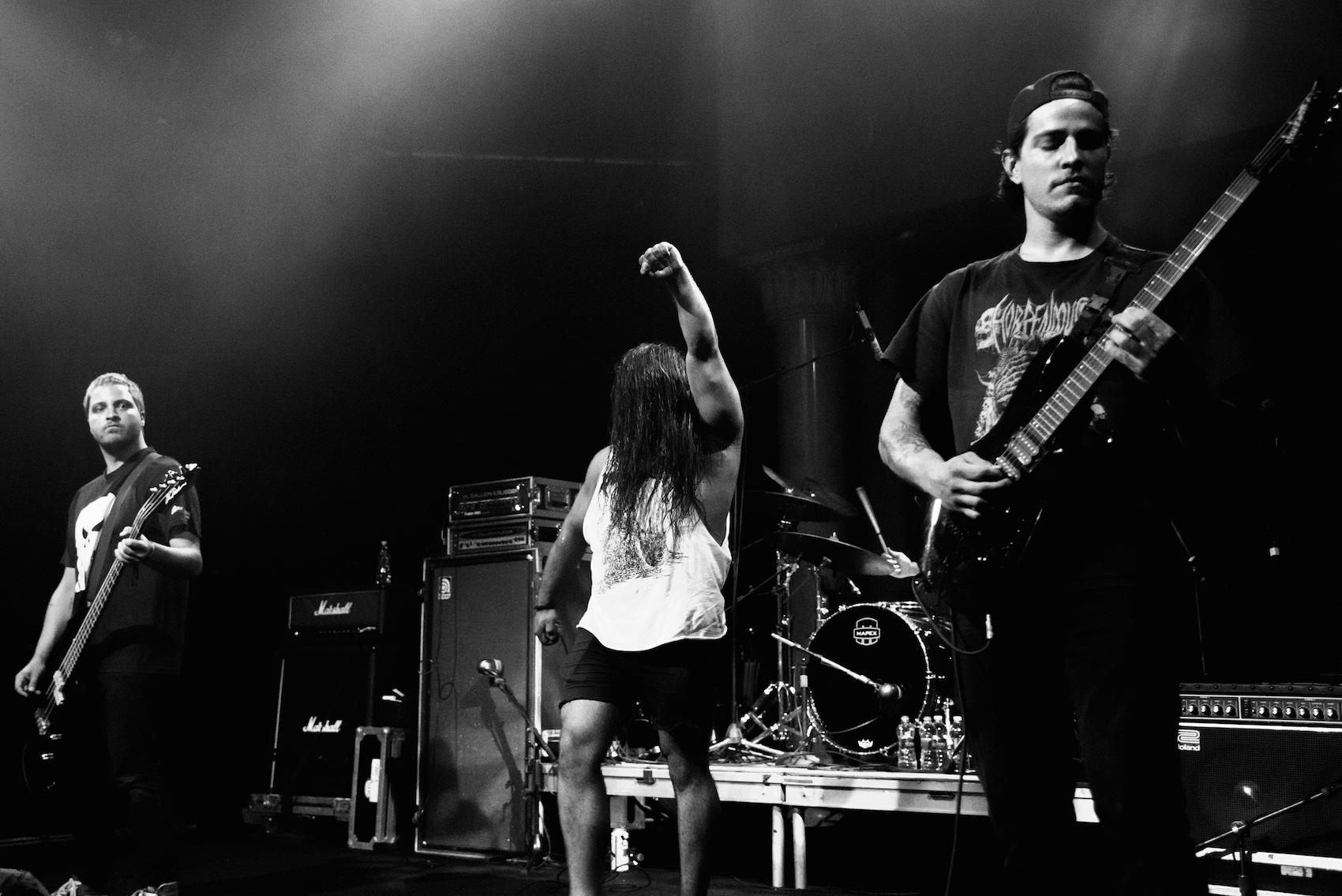
When Adelson relocated from Olympia, WA to Pittsburgh, PA, it was only logical that Migration should, well, migrate. When the festival moved, people followed. No distance was too far for the lineup offered by the two labels, who brought in bands from as far away as Ontario, New Orleans, Seattle, Portugal, and Australia. There were familiar faces like Thou, Hell, and Mutilation Rites (who had played both Wisconsin Gilead Fests and the first Migration), and new additions such as Tomb Mold, Scorched, and Cloud Rat.
At this strange summer gathering devoid of macaroni art, campfires, or canoes, there was a scavenger hunt (for 9 keys that held new Forn music), nail-bedazzling on the back patio (thanks to members of Cloud Rat, False, and Thou) and a room called the Funhouse (which doubled as the merch area). The festival’s reputation was holding true. Metal summer camp was in full swing.
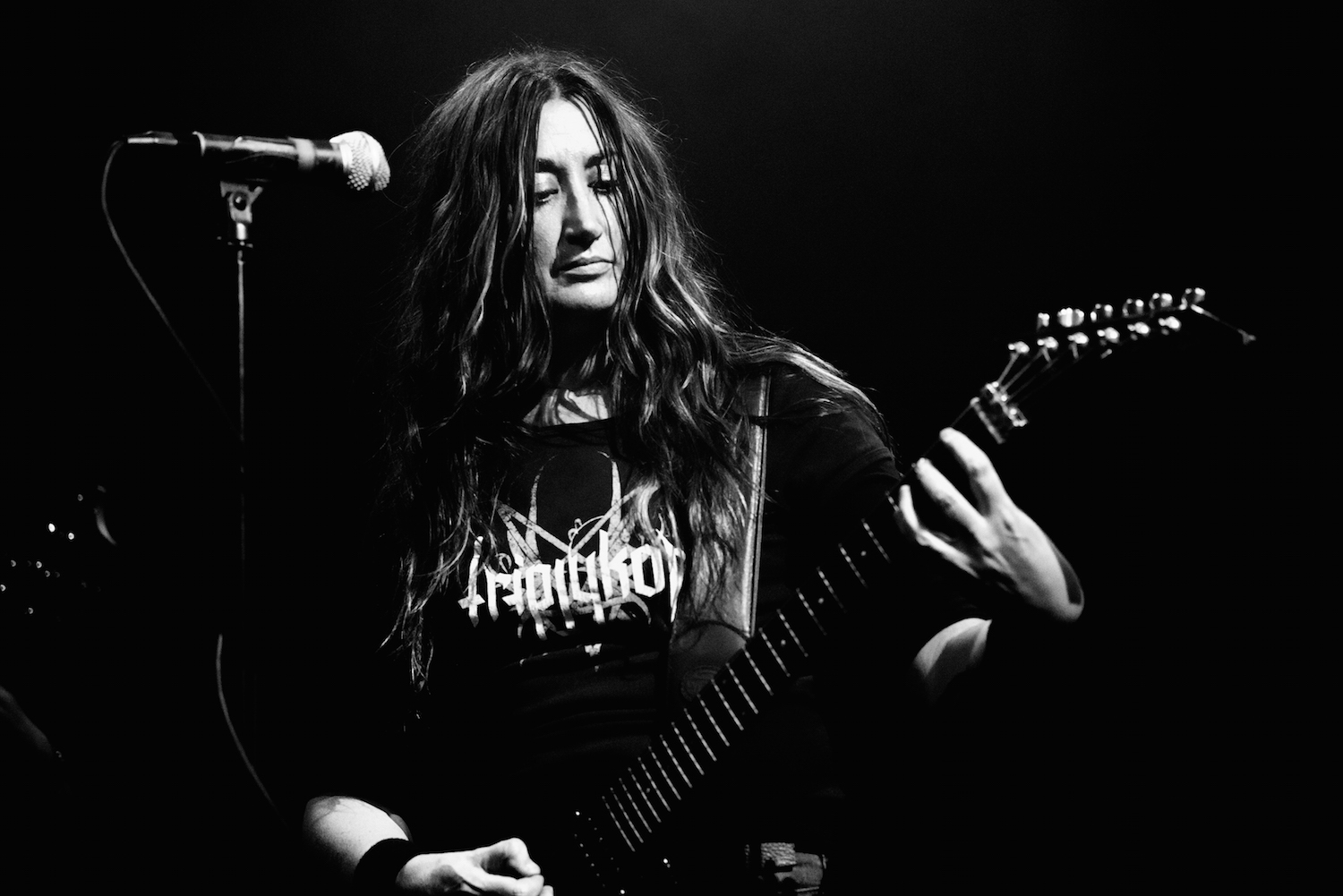
As silly as it may sound, one of the first times I thought, “I love this festival,” was when I noticed the abundance of free water bottles set up around the venue; for the 700 or so people watching bands (and drinking for hours) in the summer heat, those bottles were a godsend. But, more than anything, Migration Fest is a community. I watched False vocalist Rachel (who is a registered nurse), and half a dozen others helping someone who had passed out at the end of a long Saturday night of ingesting Mutilation Rites, Krallice, and who knows what else. I saw people standing alone become enveloped in conversation with the strangers surrounding them. I, myself, met at least ten people I knew only from the Internet, and can now call friends. People all around the venue laughed together, cried together and genuinely connected with one another.
“I spent the morning of the third day of Migration Fest walking around with some of my best friends who live in other states,” Mitch Wells of Thou told me. “Wandering around churches and eating at different restaurants. We just had a blast hanging out. Migration Fest is the one place where we all know that when we meet up it’s going to be mostly hanging out, and then some watching bands.”
It’s true. There were always people clustered on the patios, or in the cafe areas catching up with old friends and getting to know new ones. Migration is as much centered around relationships as it is music.

As with any other summer camp, there was no real reason to leave once you arrived. Mr. Smalls had a coffee shop, multiple kitchens, patios, couches, and more nooks and crannies than I could keep up with. Wherever there was vacant space, people gathered. Two large choir balconies overlooked the large floor area of the theatre, making it easy to watch alone or elbow-to-elbow. After walking through the entry door, you could see your favorite band, eat a tofu sandwich, have a cheap beer with someone from another country, and still have time to catch the next group of metalheads onstage.
“It’s not that it doesn’t feel like a fest or that you have to go out there and perform, but there’s a warmth and human element to it that, I think I speak for all of us, we haven’t found many other times—if ever,” Khemmis guitarist Ben Hutcherson, who played the first iteration of the festival in 2016, said of his experience. “It’s a really well done, well-organized, and impressively curated collection of bands who, even if they sound different, operate within the same sort of creative paradigm and headspace. Everybody gets along and has similar, if unexpected, frames of reference for talking about stuff. I’ve already talked to five or six people about Steely Dan. I’m never tired of talking about Steely Dan, but to people wearing battle vests or people that are inked up, it’s not a thing that comes up a lot. It’s such a unique and memorable experience that we’d be fools to not do it. I think any band playing this would agree that it’s such an incredible experience that we feel very fortunate to be able to be a part of it.”

Migration is also a big family reunion. It’s a place to spend time with pre-existing friends, to get to know acquaintances better, to finally meet Internet buddies, and to form entirely new relationships. It is the occasion that first brought Panopticon and Mizmor to the stage in 2016, and continued the trend this year with Daeva’s first-ever show.
Nate Garrett of Spirit Adrift summed it up well: “As soon as we showed up, I walked in and saw everybody in Deadbird and all of their girlfriends, wives and significant others that I know from Arkansas—I’ve known them for years. Those were like the first people I saw, so it was immediately like a family reunion. And then the second group of people I saw was The Ominous Circle, and that’s the band I most wanted to see and never thought I’d see since they’re from Portugal. All day it’s been close friends, cool like-minded people.”
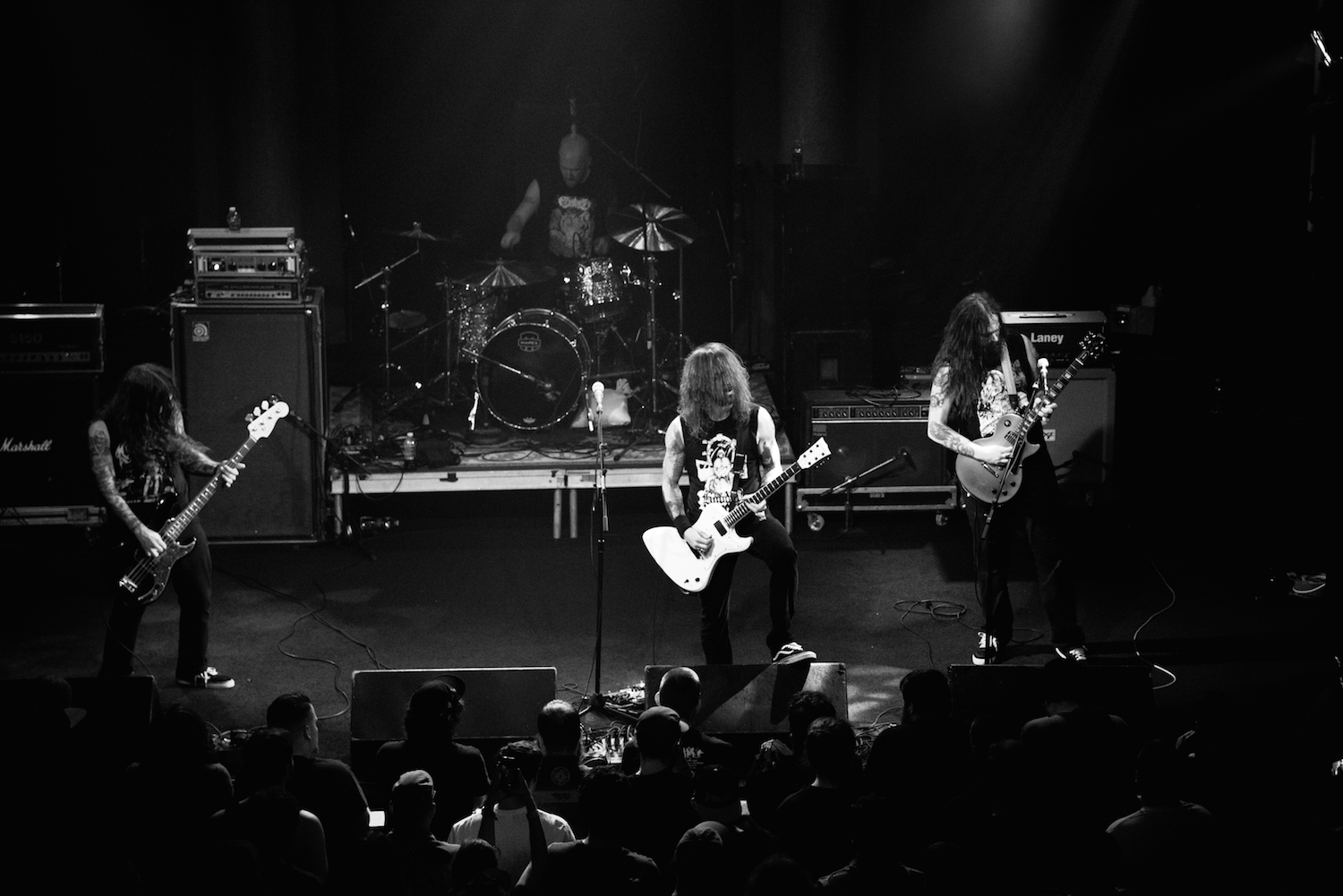
Rather than write about every band, because I very easily could, I sifted through my memories of the weekend and narrowed them down to three standouts. The set that stuck with me the most was NYC’s Couch Slut. Since I happened upon their album Contempt last year, they had been high on the list of bands I was itching to see. Couch Slut is not pretty, lyrically or otherwise. They were confrontational, raw, and borderline uncomfortable to watch. Megan’s stage presence—whether intentionally or as a natural reaction to the personal stories in her lyrics—was part exorcism and part catharsis.
I felt like I was interfering in a very personal and painful ritual as she downed beers, tugged at her clothes, paced like a rabid animal and screamed with a ferocity that was anything but fabricated. Her lyrics are darker than any black metal band writing about Satan, and more gut-wrenching than an Elliott Smith song. The rest of the band focused on the noisy punk foundation on which Osztrosits’ words sit, bringing a slight sense of stability to the otherwise unnerving performance.

That being said, there were moments of comedic relief in which she thanked her Twitter followers and acknowledged the communal hangover that the Thursday pre-fest had delivered. Overall, though, Couch Slut is a band that prompts discussion about sexual assault, trauma, gender, and other sometimes painful topics. I eavesdropped on multiple people throughout the day discussing the set and its impact on them, and heard one person saying that they had to sit alone outside for a few minutes and digest what they’d witnessed. Read the lyrics. Read their interviews. Couch Slut is important.
While the entire weekend was a highlight, nothing was more simultaneously soul-crushing and emotional than the performance from Salem, Oregon’s Hell. Hell is beyond dark; heavier than the word “heavy” can accurately describe, and entirely frightening in a way that makes you fear the shadows on your walk home. It’s the kind of band you expect to see shrouded in black cloaks and enveloped in fog. Instead, MSW, technically the sole member of Hell, was seated due to a broken foot and surrounded by members of Mizmor and Mania for the live show—no costumes and no smoke, just four people producing the most pleasantly unpleasant doom metal imaginable.
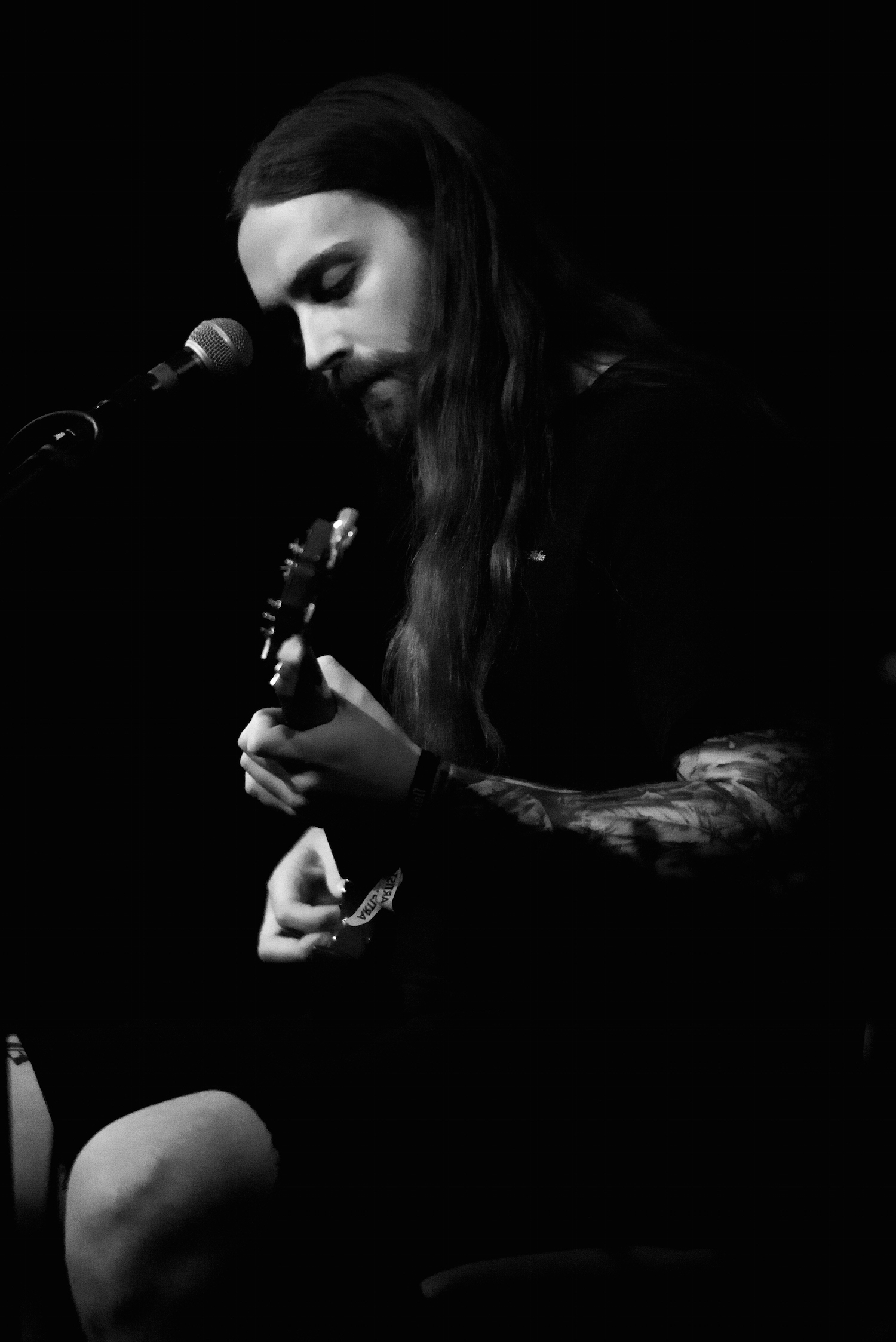
Bathed in dim red light, Hell was everything the name suggests, and yet somehow made it a beautiful experience. Hearing a song like “Machitikos” in a room full of people headbanging in unison was nothing short of magical, and the moments of listening, eyes closed, as fuzzed out shrieks punctuated the trudging “Inscriptus” were ones I would gladly relive daily. I sure hope this is what Hell is like.
Thou, as usual, provided the most entertainment with their set. Once they hit the stage, Bryan Funck immediately called for Cloud Rat drummer Brandon Hill to come up, which resulted in the entire venue singing “Happy Birthday,” as he crowd-surfed and Bryan instructed everyone to fill his pockets with money. Funck’s trademark crowd-baiting stage banter was particularly caustic that night; another of his comedy bits centered around the assumption that no one really enjoys Thou, since people always look “bored out of their skulls.”
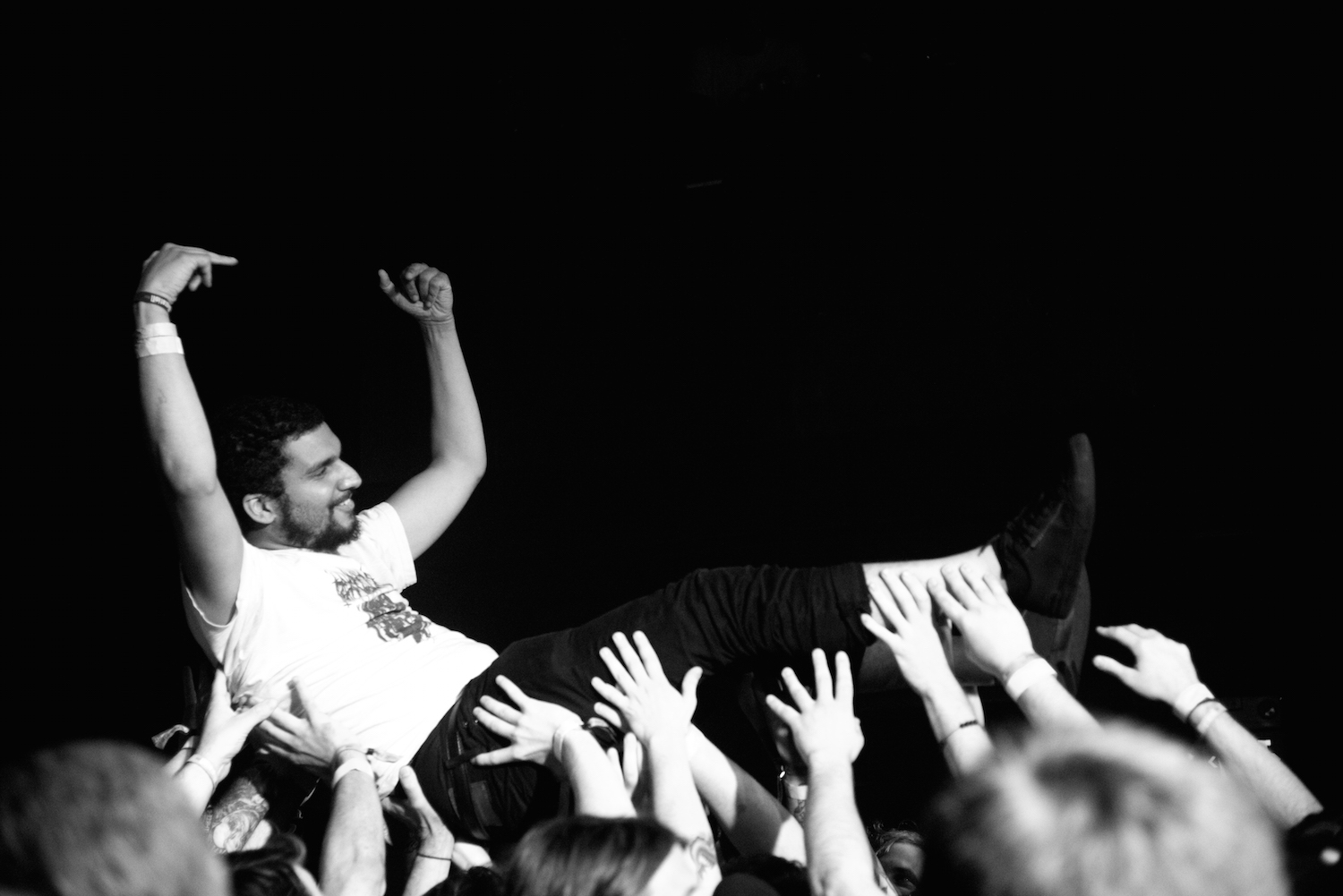
This prompted the first Thou mosh pit (to the half-acoustic “The Hammer” of all songs) I have seen since their Nirvana cover set two years ago in New Orleans; ironically, Vic from Canada’s Vile Creature had just asked if I’d ever seen a pit at a Thou show. Kismet! In the midst of all the self-deprecation and sarcasm, Thou is eternally the heaviest—even the two tracks from their acoustic Inconsolable EP were massive. There is a reason that so many people strive to own every record and shirt the band releases; alongside the trudging riffs and lyrics about anarchy, Thou is a band with personality.
Adelson said it best: “You don’t necessarily feel compelled to watch every band, so you hang out with people and enjoy being here.” Migration Fest is for the people. It’s about connecting to other human beings through heavy music. It’s about nurturing a scene. Most of all, it’s about reminding us why we started listening to metal in the first place: it gave us a family.
I have yet to stop telling anyone and everyone who will listen about how absolutely perfect Migration Fest II was. The bands, the old friends, the new friends, the venue, the city and even the bottled water—it was the summer camp of our collective dreams.
Teddie Taylor is a writer and photographer based in New Orleans; follow her on Twitter.




